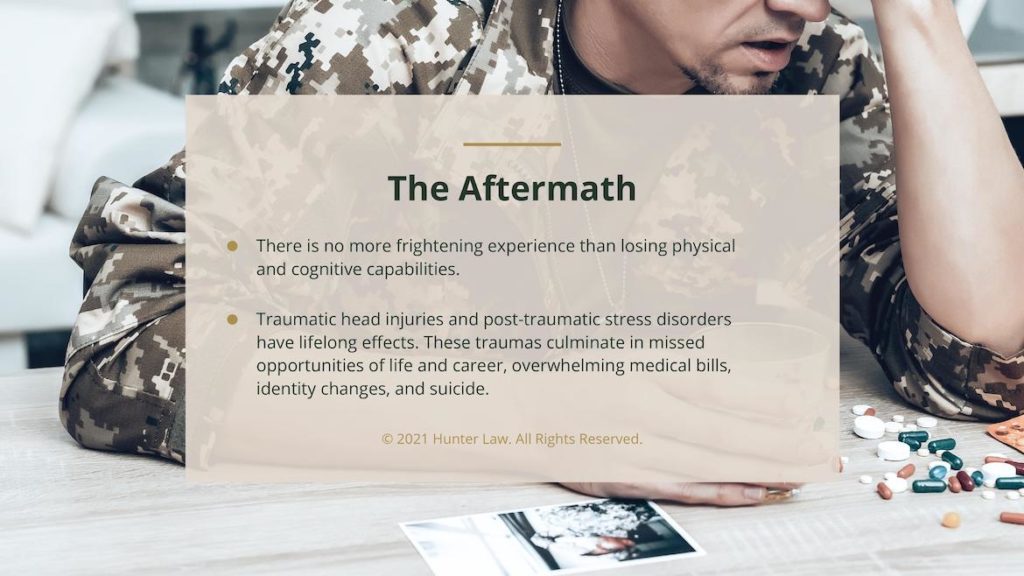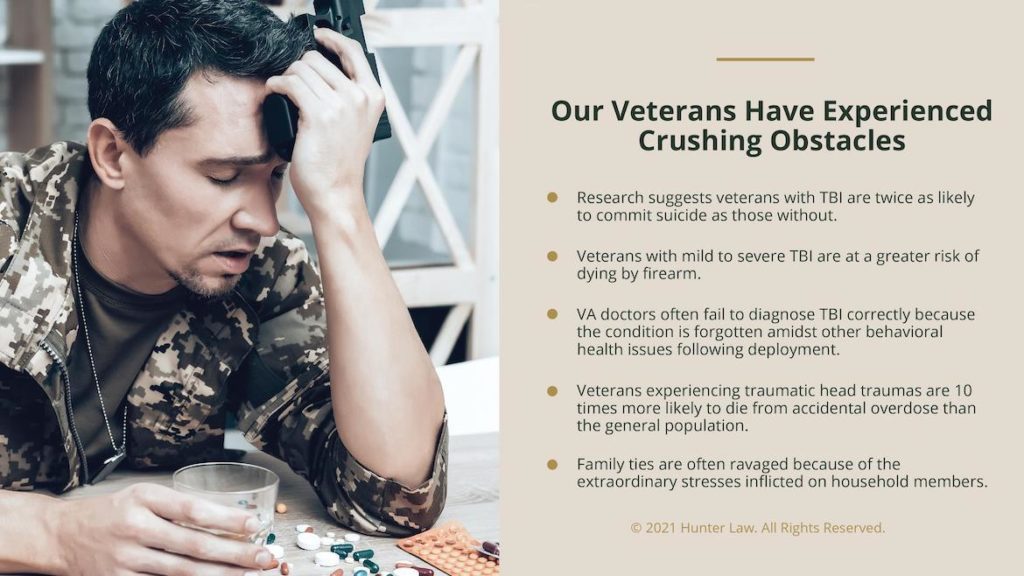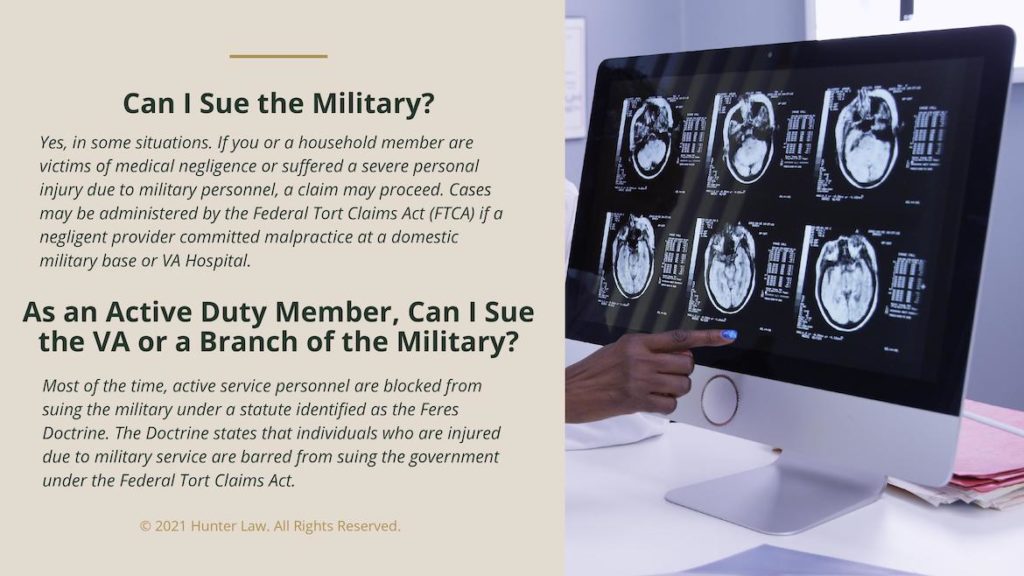Hunter Law has committed itself to the protection of our US Veterans suffering from a Traumatic Brain Injury and Post Traumatic Stress Disorders. The following post gives the reader a better understanding of how our troops are ill prepared by the Military to withstand these heartbreaking injuries.
Traumatic brain injuries produce life changing circumstance, including tragic suicide. Hunter Law and its team of skilled attorneys fight for every dime of compensation owed to these brave veterans. Opinion from the New York Times and expert evaluation from ScienceDirect on the deficiencies of the current system are pointed out.
Hunter Law fights for our troops!
Ayn al Assad AirBase
January 8, 2020, Iran attacked the al-Assad Air Base in Iraq with a barrage of ballistic missiles carrying 1000 to 2000 pounds of munitions. February 10, US Military Leaders began reporting a constant rise in traumatic brain injuries (TBI) following the strike, with the figure finally stopping at 106. Fortunately, no soldier died.
79 soldiers were diagnosed with TBI from the strikes. They carelessly sent these men back to work in 33 days. In the civilian sector, rehabilitation time for mild TBI is one week to three months and up to two years.
Hunter Law at (813) 287-2227 has a proven track record of disrupting the military machine through knowledge and tenacity. We are committed to serving our veterans.
Maj. Robert Hales said troops realized “at the site,” repeated exposure to blast waves in the hours-long attack had affected dozens. An expert in combat brain trauma, David Cifu of Virginia Commonwealth University, declared to NPR, “All concussions, all brain injuries are serious. So, they’re serious.”

The Aftermath
A report from the New York Times investigated the attack and determined that the military struggles with invisible war wounds, including TBI and PTSD.
If you served our country with honor and there is traumatic suffering, please take advantage of our FREE consultation. Contact the best Injury Attorneys in Florida at Hunter Law (813) 287-2227.
Health staff at the Ayn al Assad attack used the same ineffective paper questionnaires medics have employed for decades. Civilian research has yielded far-reaching and effective protocols for diagnosing TBI, Dementia, and PTSD; however, the military still uses the same blunt instruments.
There is no more frightening experience than losing physical and cognitive capabilities. Traumatic head injuries and Post-traumatic stress disorders have lifelong effects. These traumas culminate in missed opportunities of life and career, overwhelming medical bills, identity changes, and suicide.
Our Veterans have experienced crushing obstacles:
- Tessa Vernell and Laurence Goodman of Brandeis University established an intersection of TBI and a rise in Suicide. The research suggests veterans with TBI are twice as likely to commit Suicide as those without.
- Veterans with mild to severe TBI are at a greater risk of dying by firearm.
- VA doctors often fail to diagnose TBI correctly because the condition is forgotten amidst other behavioral health issues following deployment. VA Doctors are ill-equipped to deal with the complexities of traumatic head injuries. Scandals have broken out, reporting unqualified doctors performing the work of qualified health care employees.
- Opioids are dangerous problems. Veterans experiencing traumatic head traumas are 10 times more likely to die from accidental overdose than the general population.
- Family ties are often ravaged because of the extraordinary stresses inflicted on household members. Marriages may be strained to the point of divorce.
- Veterans with TBI experience decline later in life and frequently die within five years of the trauma.
Military’s Response to Traumatic Brain Injury and PTSD
According to the Department of Defense, 430,720 service personnel were diagnosed with TBI from 2000 to 2020. Of the total, 82.4% suffered mild cases, 9.1 percent moderate cases, and 1 percent severe cases.
A 2013 report to Congress served as the military’s bloated answer to severe trauma injuries in our Veterans. “Traumatic Brain Injury in the United States: Understanding the Public Health Problem among Current and Former Military Personnel. “
The document applies the same long-winded explanations and breakdowns without real problem-solving. Percentages from eleven years ago are eerily similar to the figures published from al-Assad and every military narrative of brain injury since 2013.

Shortcomings of the Military
A caustic review of the Military’s TBI and PTSD approach from ScienceDirect in 2014: Military Traumatic Brain Injury, “poor documentation of blast exposures and failure to identify individuals with probable TBI”
Contact Hunter Law at (813) 287-2227 if you suspect a loved one has experienced a Traumatic Brain Injury!
Does Your Loved One Suffer from TBI or PTSD? Is there a chance of Suicide? Here are some signs:
- Seizures are screaming red flags to more severe neurological damage.
- Relationships are problematic for Veterans; intimacy and connections are problems stemming from memory loss and hostility.
- Changes in personality and wild mood swings; in some mild and severe cases, radical changes develop from the veteran’s irritability and stress.
- Depression is common for veterans who feel they are no longer in control or the same person.
- Motor impairment is a significant complication in extreme cases. These cases can develop into comas and vegetative states.
23% of all combat veterans returning from the Iraq and Afghanistan wars sustained mild to severe TBI from blasts. PTSD is rearing its ugly head from constant war. Head impact, falls, and alternative causes of trauma are double the rate of the Vietnam War.
Spousal Abandonment Laws in Florida
Hunter Law: We are abundantly qualified to handle your case.
Q & A
Can I Sue the Military?
Yes, in some situations. If you or a household member are victims of medical negligence or suffered a severe personal injury due to military personnel, a claim may proceed. Cases may be administered by the Federal Tort Claims Act (FTCA) if a negligent provider committed malpractice at a domestic military base or VA Hospital. Your Hunter Law Attorney will determine a robust approach.
As an Active Duty Member, Can I Sue the VA or a Branch of the Military?
Most of the time, active service personnel are blocked from suing the military under a statute identified as the Feres Doctrine. The Doctrine states that individuals who are injured due to military service are barred from suing the government under the Federal Tort Claims Act.
Should I file an Administrative Claim?
Hunter Law would recommend against this action. There are details of the law that non-lawyers are not cognizant of when submitting an administrative case against the military. Our Attorneys are authorities in these matters, and we hold the veteran’s best interests as our priority in every case we undertake.

Settlements From a Traumatic Brain Injury
Financial hardship is often the result of traumatic injuries for our veterans: Consult Hunter Law at (813) 287-2227; our extraordinary track record of winning compensation for lost wages and health costs is unrivaled.
- Settlements may encompass a broad spectrum of remedies: home and vehicle modification, therapy, rehabilitation, and more.
- Hunter Law Attorneys fight for non-economic damages! Pain and suffering, emotional distress, worsening of prior injuries, and loss of life’s enjoyment may be part of your compensation.
- Offenders can be ordered to pay punitive damages, which is considered especially harmful behavior. When the government or military is involved, the issues become more complex. Punitive damages against the military do not carry the same deterrent effect. The need for a skillful team of Attorneys is vital.
Signature Wounds
America’s debate and eventual obsession with our Veteran’s Traumatic Brain Injuries, Post Traumatic Stress Disorders, and Suicide began in 2005. A single sentence from then-Senator Barack Obama in 2005 started the conversation. On the Senate floor, his colleagues were told, “many of our injured soldiers are returning from Iraq with traumatic brain injury,”
Doctors describe traumatic brain Injuries as Signature Wounds. The veterans suffering from these injuries are the real casualties of America’s constant war footing.
Questions directed to Military Leadership following Obama’s speech:
- Why hadn’t the military been better prepared to treat post-traumatic stress disorder (PTSD) and traumatic brain injury (TBI)?
- Why were troops being denied care and sent back to Iraq?
- Why weren’t the Army and VA doing more to address the issues?
We are committed to serving our veterans. Hunter Law at (813) 287-2227 has a proven track record of disrupting the military machine through knowledge and tenacity.


